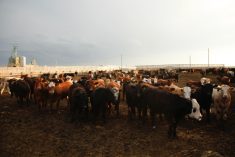Officials investigating a recent spate of porcine epidemic diarrhea (PED) cases in southeastern Manitoba hog barns aren’t yet seeing a clear picture of how the virus is spreading from site to site.
The province’s chief veterinary officer on Thursday confirmed positive tests for PED at a finisher operation in the same area as five previous on-farm cases confirmed in the past four weeks.
The latest case brings Manitoba’s total to six this month, out of 16 on-farm cases confirmed since the virus first appeared in the province in February 2014. Of the 16, nine are now “presumptive negative” for PED.
Read Also

Trump tariff on Brazilian goods could jack up U.S. burger price
U.S. President Donald Trump’s plan for a 50 per cent tariff on goods from Brazil will likely raise prices for the beef that is used in American hamburgers, traders and analysts said on Thursday, as food manufacturers increasingly rely on imports during a time of declining domestic production.
All veterinarians with clients in the area have been made aware of the latest site’s location, Manitoba Pork said in a statement Friday.
With no clear path of virus transmission yet identified, the hog agency is urging producers to restrict movements on and off their farms as much as possible.
“There’s no real good link between farms as to how this is moving around, other than the fact that they’re in close proximity to one another,” Mark Fynn, manager of quality assurance and animal care programs for Manitoba Pork, said Tuesday on the industry-sponsored program Farmscape.
“That starts us asking things like, ‘Do we have to be worried about aerosolization potentially if there’s strong winds, or is it probably more likely to moved around regionally, whether it be on roads, and that sort of thing?'”
The province’s track record in dealing with PED to date has shown it’s possible to contain these infections, he said.
“There will be an end to the outbreak but we need everyone to take it really seriously and implement as biosecurity as possible and try and limit the amount of movement in this region.”
Ontario has seen the bulk of Canada’s confirmed on-farm cases of PED, at 101, since the disease first arrived in Canada in January 2014, but has not seen any new cases since early March this year. Quebec and Prince Edward Island have also previously reported on-farm cases.
PED causes severe dehydration and diarrhea in pigs and is generally fatal in very young animals, though older animals can recover. The virus is not transmitted to humans or to other animals and is not considered a food safety risk. –– AGCanada.com Network














